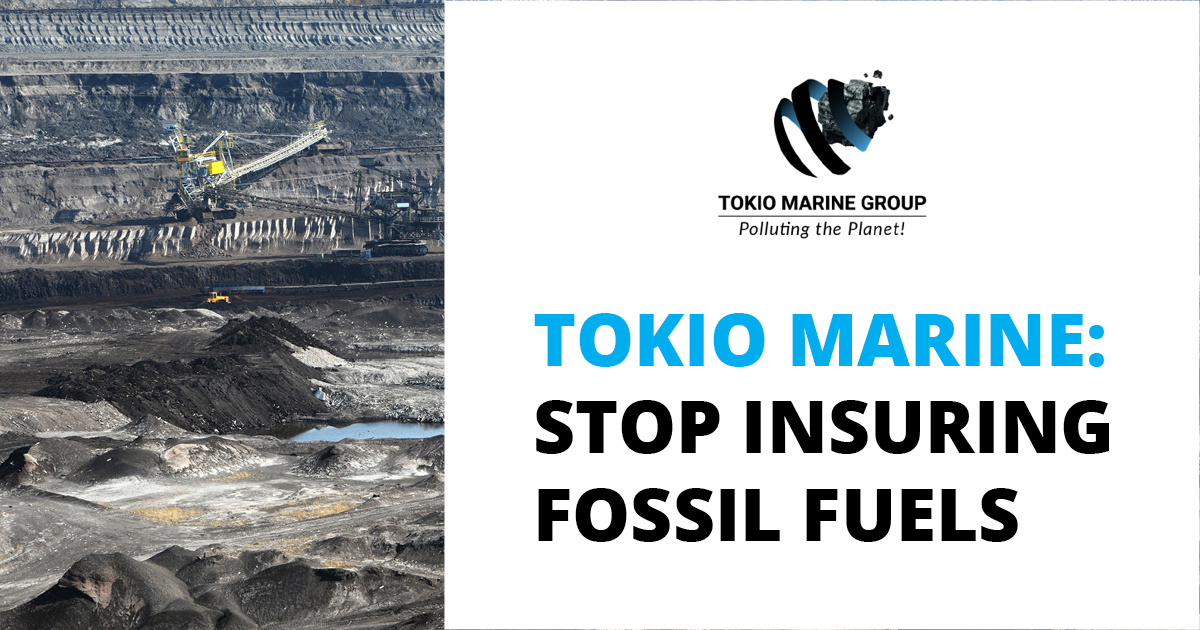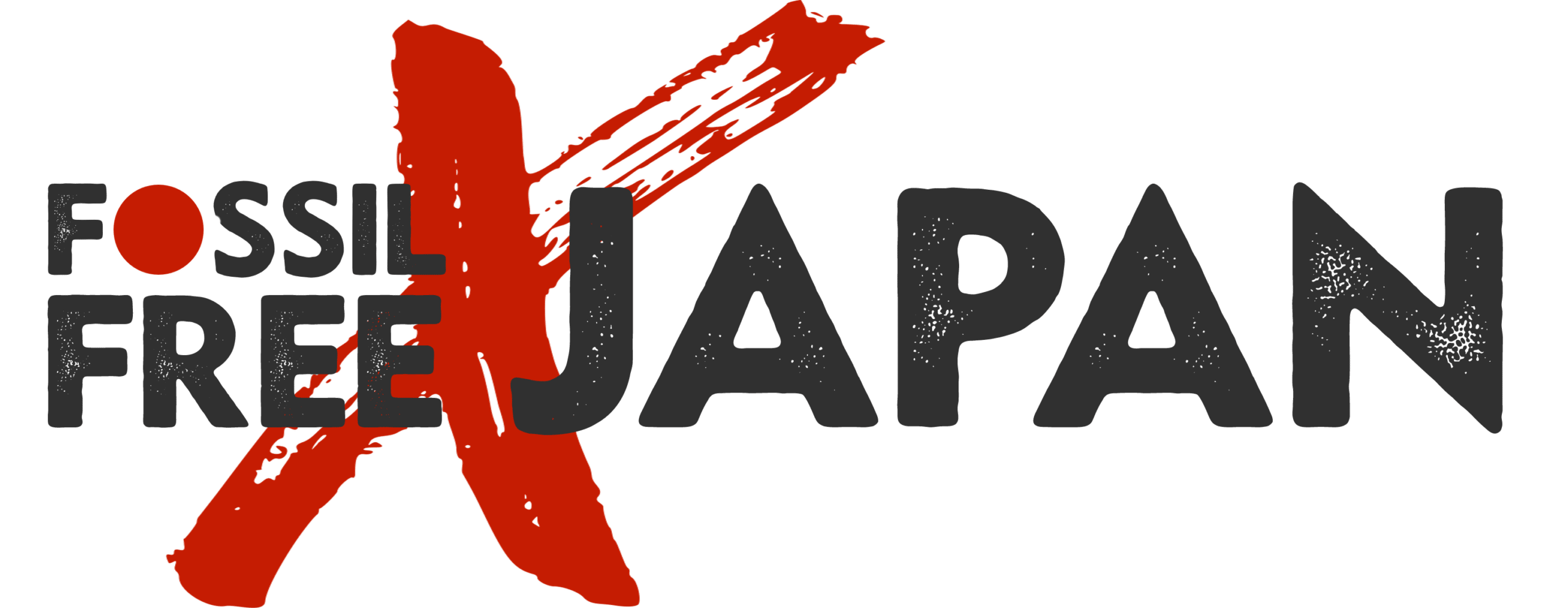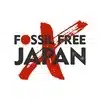
Press Release:
Over 30 Groups Call on Olympics Gold Sponsor Tokio Marine to Drop Fossil Fuels
As the Olympics Torch Relay kicks off in Japan, actions in Tokyo, Seoul, Delhi, Jakarta, New York, San Francisco, Sydney and Melbourne demand Tokio Marine take climate action
TOKYO (March 25, 2021) – Starting today, actions around the world mark the global launch of a campaign calling on insurance giant Tokio Marine to stop underwriting and investing in fossil fuel projects driving catastrophic climate change. The campaign launch coincides with the start of the Olympics Torch Relay and highlights Tokio Marine’s role as an Olympics Gold sponsor.
In a letter to Tokio Marine President and CEO Satoru Komiya, over 30 groups from around the world called on the company “to adopt a policy aligned with the goals of the Paris Agreement, that will rule out insurance services for any new coal, oil and gas projects with immediate effect.” Signatories included community groups, Indigenous Peoples’ alliances, and international NGOS. The events they organized to amplify the demands in the letter took place at the site of different Tokio Marine offices around the world.
Hasan Mehedi, member secretary of the Bangladesh Working Group on External Debt (BWGED), explained, “We are fully aware that without insurance, fossil fuel projects including the Matarbari Coal Power Complex and the Meghnaghat LNG Power Plant in Bangladesh can’t be built or operated. These are projects that destroy all our options for being resilient in the face of the climate crisis. There is no time to wait, Tokio Marine must immediately exit from all fossil fuel investments and underwriting, in line with the Paris Agreement and Marrakech Declaration of the Climate Vulnerable Forum.”
Tokio Marine’s September 2020 coal policy “in principle” rules out insuring new coal projects, but contains so many loopholes that it enables any power project conceivable in the pipeline to receive insurance, according to Insure Our Future’s analysis. Loopholes include “circumstances such as national energy policy and other considerations in the relevant country” as well as projects associated with development export credits. The policy also fails to include divestment from coal, mention any other aspect of the coal value chain (such as associated infrastructure, mining or shipping) or acknowledge internationally accepted standards to respect Indigenous Peoples’ rights, which are often violated by fossil fuel projects.
Yuki Tanabe, Program Director at the Japan Center for a Sustainable Environment and Society (JACSES) affirms, “Tokio Marine fails to ensure consistency with Japan’s net zero commitment and the long-term goals of the Paris Agreement. Tokio Marine needs to create a comprehensive fossil fuel policy that commits the company to not underwrite or invest in any coal or other fossil fuel projects.”
Tokio Marine’s CEO Satoru Komiya calls climate change “a top-priority issue that we must address head-on.” Yet, Tokio Marine remains among the top 10 insurers of destructive coal, oil, and gas projects around the world.
Vidya Dinker of the Indian Social Action Forum asserts, “It’s what communities on the ground experience that is the true test of public relations statements by corporate giants like Tokio Marine. Local residents and citizen activists across India as well as Australia and Bangladesh are firmly opposed to coal projects like Adani’s Godda coal power plant. Most financiers and insurers have stepped firmly away from destructive projects like this one, which are neither wanted nor needed. We urge Tokio Marine to live up to their ‘gold partnership’ this Olympics and aim faster, higher, stronger! They must turn away from underwriting projects like Adani’s Godda plant which would be destructive for people and the environment.”
***
For more information or to arrange an interview, please contact:
Tanya Roberts Davis, tanya.robertsdavis@sunriseproject.org.au, +778-788-0782 (Asia, US)
Camilla Schramek: camilla.schramek@sunriseproject.org.au, +45 50 22 92 88 (Europe)
***
Background:
At least 26 insurance companies globally have ended or limited their coverage for coal projects, representing more than half the global reinsurance market. This has resulted in coal companies facing rate increases of up to 40%, and some projects struggling to obtain coverage at all.
Dropping coal also makes financial sense for insurers. Climate-driven disasters cost the insurance industry $82 billion in 2020.
Societe Generale found that exiting coal adds billions to insurers’ valuations. This echoes findings from a 2020 Moody’s report, which considered insurers dropping coal to be “credit positive, as it protects them against potential climate change liability risk, and reduces the risk of their investment assets becoming ‘stranded’.” In this context, Tokio Marine, a conglomerate with 240 subsidiaries and over US$48 billion in revenue, that operates international hubs from Asia, Europe and the US, stands as a clear climate laggard, being among the top ten insurers of coal, oil and gas worldwide.
***
Projects Listed in the Statement Annex:
The letter specifically calls on Tokio Marine to confirm it “will not provide any services for expanding, developing or further enabling fossil fuel ventures, including but not limited to”:
In Argentina and Brazil
- Offshore and onshore oil and gas extraction projects
In Australia
- Adani’s Carmichael Coal and Rail Project, and port at Abbot Point
- Barossa Gas Development Project
In the Bahamas
- Bahamas Petroleum Company’s offshore oil drilling
In Bangladesh
- Matarbari Coal Power Hubs
- Phulbari Coal Project (Units 1-4)
- Reliance Meghnaghat LNG Based Power Plant
In Canada/the US
- Arctic oil and gas drilling, including in and around Alaska’s Arctic National Wildlife Refuge
- Enbridge Line 3 Replacement Pipeline
- Trans Mountain Pipeline
- Mountain Valley Pipeline
- Rio Grande LNG Export Terminal
- Canada LNG Export Terminal
In India
- Adani’s Godda Coal Power Project
In Indonesia
- Cirebon Coal Power Station (Unit 2)
- Indramayu Coal Power Station (Unit 4)
- Suralaya Coal Power Stations (Units 9, 10)
- Tanjung Jati A Power Station (Units 1, 2)
- Tanjung Jati B Power Station (Units 5, 6)
- Central Java (Batang) Power Station
- PT Bayan Group’s coal mining and infrastructure assets (mines, crushing facilities and land to sea infrastructure, incl. jetties and terminals for export-bound shipping)
In Mozambique
- LNG terminals along the coast of Cabo Delgado (Rovuma Basin and surrounding areas)
In Russia
- Arctic LNG 2 Project (northern Siberia)
In Tanzania and Uganda
- East African Crude Oil Pipeline
In Thailand
- Hin Kong (Muang Ratchaburi) Gas Power Project
In Vietnam
- Nghi Son II
- Vung Ang II
- Van Phong 1
- Vinh Tan Coal Power Complex
***
Signatories to the letter included the following local, national and international groups and alliances:
Asian Energy Network, Asia
Asian Peoples Movement on Debt and Development, Asia
Action for Ecology and People’s Emancipation (AEER), Indonesia
Bahamas Reef Environment Educational Foundation, Bahamas
Bangladesh Working Group on External Debt, Bangladesh
Center for Energy, Ecology and Development, Philippines
Coastal Livelihood Environmental Action Network, Bangladesh
Environics Trust, India
First Peoples Worldwide, USA
Friends of the Earth – Japan, Japan
Global Catholic Climate Movement, International
Green Innovation and Development Centre, Vietnam
Growthwatch, India
Japan Center for a Sustainable Environment and Society (JACSES), Japan
Inclusive Development International (IDI), USA
Indian Social Action Forum (INSAF), India
Indigenous Environmental Network, USA (Turtle Island)
Insure our Future, international
Indonesian Forum for the Environment (WALHI), Indonesia
Indonesian Forum for the Environment (WALHI) – West Java, Indonesia
London Mining Network, UK
Market Forces, Australia
Oil Change International, USA
Our Islands, Our Future Coalition, Bahamas
People’s Coalition for the Rights to Water (KRuHA), Indonesia
Public Citizen, USA
#StopAdani Campaign, Australia
#StopEACOP Alliance, International
Solutions For Our Climate, Korea
The Sunrise Project, Australia
Trend Asia, Indonesia
Waterkeeper Alliance, USA
Waterkeepers Bahamas, Bahamas
Waterkeepers Bangladesh, Bangladesh
Urgewald, Germany
350.org Japan, Japan

